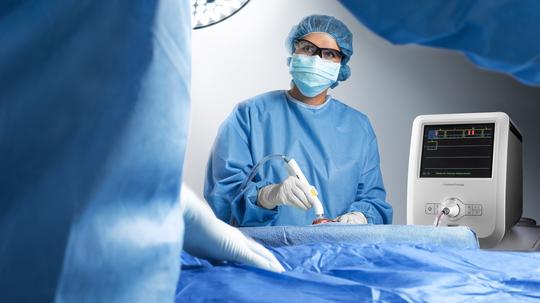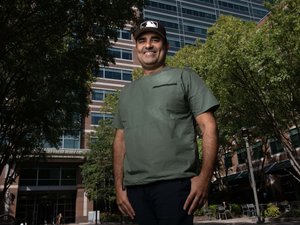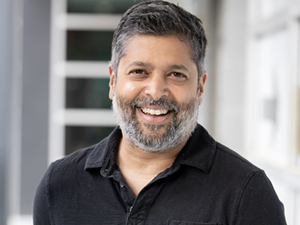
Some of the worst news a doctor can deliver to a cancer patient post-operation is, "We didn't get all of the cancer."
Now, imagine a future where those words were never uttered again. Seems impossible for this day and age, right?
The scientists, leaders and investors of Dune Medical Devices don't think so, and they're working towards eradicating the need for more than one operation to remove cancer from the body---a feat more than 20 companies have been unable to accomplish in the past two decades.
The startup, which was founded in Israel in 2004 and later moved its operations to Atlanta, was founded by Dan Hashimshony, who discovered how to differentiate healthy tissue from cancerous tissue using physics and an algorithm. Using the algorithm, Hashimshony developed a pen-like probe that could determine if tissue was cancerous during surgery.
"At the time, what they realized was that while certainly it can work in all solid organ tumors, where it has the most use was in the breast, only because ... that was the biggest need at the time," Dune Medical Devices CEO Lori Chmura said. "And still today, really we're the only technology that has been able to address this problem."
The Tech
Despite the leaps and bounds in medical science, lumpectomy surgery, which makes up about 60 to 70 percent of all breast cancer surgery and has the same survivability as a mastectomy, still comes with a 25 percent re-excision rate---meaning another surgery for the patient, Chmura said. Even with a surgeon's best efforts, there is still a significant number of surgeries that do not remove microscopic residual cancer.
In addition to having to go under the knife, stress and cost of another surgery, the founders of Dune Medical Devices learned that women who had a re-excision were two times more likely to have a recurrence of their cancer, she said.
"So imagine for all these years, the physicians just kind of accepted this [as] fact, and they'd actually tell their patients, 'Well, that's part of ... lumpectomy surgery. One in four patients have to come back for a re-excision,'" she said. "Coming out with this technology that reduced the re-excision rates, [there was] a lot of skepticism. It was paradigm shifting technology. It was adding technology to a procedure that they didn't have before."
"The more challenging it becomes, the more it drives me."
Convincing surgeons to use the technology proved to be one of the toughest battles for Dune Medical Devices, even though the device they made worked, Chmura said. The task was so difficult, she said she was home a total of five days during her first 90 days on the job while she was trying to learn everything she could about breast cancer and the medical market.
"When I joined the company, it was really a company that was run by scientists. They were incredibly smart, and they have great technology," she said. "But when you bring something paradigm shifting into the marketplace, you really have to think a lot about ... [helping] the physicians see what the need was and what the advantage was to doing something different that they hadn't done before."
The Investor
Dune Medical Devices has raised a total of $35 million and is currently raising funds for a Series C round, but any seasoned investor can tell you how risky early-stage investments are, especially for medical tech.
Despite the odds, Amos Goren, a special partner at Apax Partners who manages the VC firm's healthcare portfolio, saw potential in Dune Medical Devices. A Harvard Business School graduate based in Israel who started working with Apax in 1997, Goren was introduced to the company in 2004 and was initially impressed by the company's technology and broad potential.
After assessing the technology, clinical, regulatory and market risk, Goren asked himself what the payoff for supporting a company like Dune Medical Devices would be if it worked.
"If you can overcome these different risks along the way, then it's worth it because of the potential, the broad applications of technology. And that's exactly what we saw in it," he said.
Long-term, Goren and Apax saw what Dune Medical Devices could be. Beyond surgery, the technology could be used to revolutionize the treatment of cancer, he said.
"What we saw is that they were really doing something that nobody was able to do, [that] nobody had ever done before."
"It's applicable to really any type of solid tumor," he said. "It could be used for early detection or diagnosis, such as in biopsy. It could be used in surgery, to assist in more accurate surgery. And then it could be used in all certain targeted treatment in all cancers. We saw a multi-billion dollar opportunity here. That is extremely challenging, but it's really revolutionizing. What we saw is that they were really doing something that nobody was able to do, [that] nobody had ever done before."
Goren invested his own money in the company following Apax’s investment. He said a vision like Dune Medical Devices is possible, but it takes significant growth.
"It takes time. You need patience, and you need to stay the course and believe in the vision and adapt if need be and modify," he said. "But I think we feel very, very confident now that, you know, we've progressed to a point where we don't have to prove the clinical utility of this."
The Skepticism
One of the causes of skepticism among physicians came from the ease of use of the device, Chmura said. Despite the device being crafted from sophisticated physics-based technology, doctors were distrusting of a pen-like probe attached to a console monitor that would flash red or blue to determine if tissue was cancerous.
“It didn’t show everything that was actually happening behind the scenes,” she said. "I hate to say this, but it really is true—we actually had one doctor who said that it was almost like the physician did their surgery and then when their surgery was over, this device, this brand new device came in and told them whether or not they did a good job or a bad job.”
If a physician failed to remove all the cancer, the graphic user interface on the monitor would flash red and make a loud error sound, similar to the game Operation, Chmura said.
"A lot of the physicians actually, once we got close to them, confided in us that [these results were] really hard, because they had thought that they had done the best operation for the patient," she said. "What we had to do from a company perspective is we really had to think about that and think about ... if you will, these visceral reactions that were happening. And what we did is we come back at it with data ... We combated it with the data and showed them what the actual results were so that they could objectify it."
Pulling back the curtain on the technology and showing surgeons how the algorithm worked was a game changer for the company, Chmura said. When asked if the challenges the company faced were ever discouraging, she said she's often encouraged to push forward and try harder during trials and tribulations. She tells her employees some days are diamonds and some days are stone.
"If you ask my husband that question, he would say that I'm like this eternal optimist," she said. "The more challenging it becomes, the more it kind of drives me."
The Drive
When in doubt, Chmura reminds herself and her team of the success stories the technology has created for women who are able to avoid a second surgery and potential recurrence. The mission of Dune Medical Devices became extremely personal to Chmura, who's been with the company since 2016, two months ago, when her husband was diagnosed with metastatic lung cancer to the brain.
"I think it's absolutely reinvigorated me if you will, or refocused me on ensuring that our vision is capitalized on."
"It grounded me in why we're doing what we're doing because ... the technology right now is for breast cancer, but we're developing soft tissue biopsy and our goal is this ... is going to be a surgical oncology tool for all solid organ tumors."
Her own personal experience has reinforced the idea that it's vital to remove all cancer at once during the first surgery, and how a diagnosis can overwhelm a family, Chmura said.
"I think it's absolutely reinvigorated me if you will, or refocused me on ensuring that our vision is capitalized on," she said.
The Moonshot
To date, Dune Medical Device's first generation device for breast cancer is on the marketplace and has been used in more than 19,000 procedures. The device is in five key markets in the United States, performs 22 percent of all lumpectomy procedures in Israel and has entered clinical trials in the U.K. The second generation of the device, the Marginprobe 2020, is on the way, and the company was recently awarded a $3.5 million grant from the European Union to develop its next generation technology---a soft tissue biopsy device.
The soft tissue biopsy device will utilize miniaturized sensors that will open Dune Medical Devices to tackle lung cancer, colon cancer and other cancers in the body.
"the leap from science or technology to product is very steep. There's a lot of regulatory hurdles ... Our algorithm, that's really where I think we have differentiated ourselves."
When asked why Dune Medical Devices was able to break the mold when many companies before it were unable to, Chmura said the differentiator was the original team and having an algorithm that works consistently every time *it’s* used and is proven to reduce re-excision
"I want to say probably 20 companies or so have all tried this. And as our chief scientific officer would say, there's a lot of technologies out there, there's a lot of science out there that can help differentiate tissue," she said. "But the leap from science or technology to product is very steep. There's a lot of regulatory hurdles ... And what we've seen is some of these companies have been at it for more than 20 years and ended up running out of money because they cannot consistently, reliably and predictably give that feedback to the end user. Our algorithm, that's really where I think we have differentiated ourselves."
But the mission for Dune Medical Devices has gone beyond technology---since moving to Atlanta, the company has made active efforts to assist cancer patients and survivors in the community. The company has advocated for Georgia to adopt Margie's Law---a law that requires healthcare facilities performing mammograms to inform patients if dense breast tissue was detected. It was named after a Savannah woman, Margie Singleton, who has been advocating for the legislation since she was diagnosed with breast cancer. The company is also working closely with U.S. Rep. Lucy McBath, D-Ga., to support bipartisan bills that lower costs of healthcare and support medical innovation.
"One of the big things that we wanted to do when we came to Georgia was to really become a good corporate citizen as soon as possible," she said.
To check out moonshots in all 13 Inno markets, click here.








